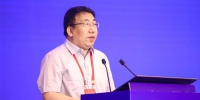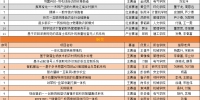美国私立高中:每节课都培养学生创造力
乔治城预备中学Scott R. Pilarz, S.J
导语: 今年9月,中国国家主席习近平与美国总统奥巴马就发展中美两国关系达成多项共识,共识之一就是继续加强中美两国青年人之间的文化交流,这将为更为中国学生赴美学习带来便利。近日,美国久负盛名的男校乔治城预备中学校长Scott R. Pilarz, S.J.来到中国,就中美教育发展等问题接受了《财经国家周刊》(Economy & Nation Weekly)的专访。乔治城预备中学是全美最古老的一所耶稣会会士学校,也是唯一一所寄宿制耶稣会会士学校。
《财国》:您如何看待中美两国学生到对方国家学习?
Scott R. Pilarz, S.J.:作为一个美国人,看到大量的中国学生到美国学习是令人兴奋的。这对学生们将非常受用。一方面,我们美国人可以了解中国和它的文化;另一方面,中国学生将获得一生受益的学习经历。这种交流会将中美两国文化联系在一起,对彼此都有好处。
《财国》:在您看来,中美教育的差别是什么?
Scott R. Pilarz, S.J:坦率地说,我对中国教育了解不多。根据我现有的了解,美国的教育更加注重培养学生的综合能力。在美国,学生要学习英语、数学、科学、社会科学、历史、宗教等多个学科。所以,美国学校非常重视学生的综合学习。美国的学校,特别是预备中学,对课外活动也非常重视,学生在课余活动中会演奏音乐,这样的活动也非常多。我不知道中国学校是不是也会安排类似的活动。同时,美国学校会要求学生做社会调查,每年学生都要完成数小时的调查实践。
《财国》:乔治城预备中学招收对申请者的要求是什么?
Scott R. Pilarz, S.J:我们要求申请者具备一定的英语语言能力。乔治城预备中学大部分课程都是英语授课,只有一小部分第二语言课程。因此,英语水平是必需的,我们会优先考察申请者的英语能力。
《财国》:目前,越来越多的中国家长将子女送到美国学习,有的从小学一直读到研究生。对于他们,您有哪些建议?
Scott R. Pilarz, S.J:我要强调英语非常重要,这是一个基础。我很欣赏中国家长在孩子很小的时候就送他们到美国学习,要知道,美国家长不一定会这样做。在我看来,这需要勇气。这样的教育会让学生接受不同的文化,并充分感受不同的文化,甚至从中受益。
《财国》:在您看来,如何在学校阶段培养学生的创造性。
Scott R. Pilarz, S.J:的确,在学生阶段需要增强他们的创造性。学生们有充足的时间与精力去思考不同的想法、不同问题的解决方法。因此,这将促进学生的批判性思维,发展奇思妙想。创造力与自由思考非常关键。写作、艺术等方面的创造力培养非常重要,学校一直大力发展这些学科。
Scott R. Pilarz, S.J(右二)接受《财经国家周刊》采访
《财国》:那贵校有专门提高创造力的课程吗?
Scott R. Pilarz, S.J:事实上,我们在每节课中都注重培养学生的创造力,让他们对身边发生的一切都要注重创新。我们的课程中没有太多机械性背诵的内容。
《财国》:所以,贵校对个性教育非常重视。
Scott R. Pilarz, S.J:非常正确!我们尽力满足每个学生的个性要求,让每个学生的个性都得到发挥。要知道,每个学生都是不同的,他们都有自己的梦想、希望与焦虑。我们希望了解他们的特点,量体裁衣,设计适合他们的教育方式。
《财国》:对很多学生来说,他们很年轻,一些从出生就和父母一起生活至今。您觉得他们该如何克服美国学习中的文化差异?
Scott R. Pilarz, S.J:是的,我非常欣赏这些学生“冒险”来到一个完全不同的文化中学习生活。他们非常开放,愿意接触非中国同学。我们现有25名大陆学生,我们会建议他们适时分开生活。他们其中的一些会出去过周末,有的会留在了解美国学生的生活特点。我们有很好的办法帮助他们克服文化差异。
文| 《财经国家周刊》记者吴亮、姜铁英实习记者龚琬茹
乔治城预备中学创建于1789年,位于马里兰州,是一所男子住宿中学,主要提供9-12年级课程。全校人数为460人,住宿生约100人,分别来自美国本土22个州和世界上13个其他国家。学校由美国的第一个天主教主教在1789年建立。乔治城预备中学是全美最古老的一所耶稣会会士学校,也是唯一一所寄宿制耶稣会会士学校。
附采访英文部分:
Economy & Nation Weekly: What do you think of current communications of education between China and U.S?
Scott R. Pilarz, S.J.:From American aspect, we’re very excited to have seen Chinese students studying in the U.S. especially for our students. It is beneficial. We learn about China and Chinese culture. And for Chinese students, it is a life experience in the U.S. It seems very remarkable that it brings two nations’ culture together. And it’s good for both.
Economy & Nation Weekly: What is the difference between your education and China’s?
Scott R. Pilarz, S.J: I don’t know much about the Chinese education. But I’ve done a little bit of reading. From my perspective, our education is broader base. Students can take a lot of subjects such as English, mathematics, science, social study science, history and religion class. So it is a large emphasis on the broad range. American school especially preparatory schools like us who have a lot of emphasis on extra curriculum. So what goes on after class end such as music and drama. There are lots of extra curriculum activities. I am not sure that’s true in China or not. It is difficult to say. And also some schools require their students to do some survey course. So every year, they have certain amount hours of surveys.
Economy & Nation Weekly: We’d like to know what is your requirement for the students before they’re enrolled.
Scott R. Pilarz, S.J: We require certain level of English. You see taking most of the class will be English. We do have some small second language program. But English must be required. English will be the first priority for a choice.
Economy & Nation Weekly: We see that lots of Chinese parents would like to introduce their children to study in the U.S. from the very beginning to the mater degree. So do you have any suggestions to them?
Scott R. Pilarz, S.J: I would stress the preparation of English. That’s the base line. I would really admire Chinese sending their children to the U.S. especially at the young age. There aren’t many American family do, as these parents would do that. I found it really heroic. They would like to be engaged in different culture and learn from that and can stress it enough, even take advantage of it.
Economy & Nation Weekly: We would like to talk more about the creativity. From your point of view, how to become creative from school?
Scott R. Pilarz, S.J: Recently, they do enrich creativity. They often have a lot of time and energy to spend on exposing to the different ideas different approaches to things. So they would think critically and think of different points of view. Creativity and freedom of those points of view are very important. Creativity especially in writing, in the arts, all of those are very important. We promote that all to our school.
Economy & Nation Weekly: So in your school, you just have special training program to improve the creativity?
Scott R. Pilarz, S.J: It’s built in the curriculum in every class. So there will be creativity proponents just about everything. So there is not much route memorization.
Economy & Nation Weekly: So you focus on the individual education?
Scott R. Pilarz, S.J: Very much so! We try to meet each student. So each student is what he is. They ‘re not the same. Each student is unique with hopes and dreams and anxiety. We want to understand that and tailor the education to that way.
Economy & Nation Weekly: For these students, they’re very young; maybe they live with their parents from when they are born. Do you have any advice to help them to get used to the culture?
Scott R. Pilarz, S.J: Firstly, I really admire going to take this risk in living a very different culture. They have openness to meet the non-Chinese students. We have 25 Chinese students, we want to carry them not only always stay together. So some of them would go home for the weekends and go home for the holidays, and spend time on the campus to see how American family life is. So we do have program and try to help them.
Georgetown Preparatory School is an American Jesuit college preparatory school for boys grades 9 through 12. It is among the most selective prep schools and the oldest all-boys school in the United States. The only Jesuit boarding school in the country, it is located in the Roman Catholic Archdiocese of Washington on 90 acres (360,000 m2) in the suburban community of North Bethesda in Montgomery County, Maryland, outside of the District of Columbia.
编辑:夏青






